We begin with the video above, which exploded across Israeli social media yesterday. At first people weren’t sure if it was real, or a spoof. Israel is catapulting fire over a wall, in a war that is being fought with F-35s, AI drone swarms, hypersonic missiles and like? Really? What the h***?
Well, it seems that it’s real. Someone who has served in the north explained to me that Israel is trying to burn the thick brush on the Lebanese side of the border so Hezbollah terrorists can’t hide in it. And why are we not dropping flammable material from helicopters? No one I’ve spoken to has any idea. Are we running out of materiel?
But you can imagine the social media quips. “When the Second Temple fell, it was the Romans who were using catapults. Now, 2000 years later, it’s we who’re using them.”
Israel Hayom suggested that it wasn’t all that bad. It’s not like the tactic is really 2000 years old. It was used, the paper said, as recently as the 15th century. Ah, that’s much better ….
People really didn’t know whether to laugh or cry—because it looks so ridiculously hapless and thus seems like a metaphor for so much …
Today, we want to look at the “kids.” As we’ll see from a few vantage points, “the kids are not alright” (with apologies to Annette Bening and Julianne Moore). We take a look at a message from the Teachers’ Union that’s often on TV, a social media post that’s a brief insight into what many families are coping with, and an article on the grandparents who’ve had to become, once again, parents.
First, though, a look at some of what we hope to share this coming week.
Gideon Sa’ar, an on-again-off-again ally of the PM (now “off”) has long had aspirations to the Prime Ministership. He gave a long podcast interview in Hebrew to YNet’s political podcast, and made the following points, which we’ll share at greater length next week:
Israel is embroiled in an existential war, as Iran has plans to make sure that Israel no longer exists by 2040. Thus, this is not about another six months, or a year, or two. years of war. This could be the new normal, in many ways, and Israel is not prepared.
Israel is not winning this war, nor is it getting any closer to victory, says Sa’ar.
The Haredi draft is non-negotiable. We’ll need a much larger army for as far as the eye can see, and they simply have to serve.
Bibi needs to go.
And more.
Sa’ar is a very thoughtful person, and though he’s not currently polling well, his ideas are well worth sharing beyond the Hebrew-speaking public. So we’ll do that next week.
We’re also going to look at “memory” next week. The book above, One Day in October, has been out in Hebrew for a while, and is a moving, painful, inspiring read composed of 40 stories of heroism from October 7th. It will be published in English in October.
In one of this week’s podcasts, we’ll meet the publisher of the book, whose story of making aliyah and creating perhaps the Jewish world’s most influential publishing house is one of those “this could only happen in Israel” stories.
And we’ll look at a few other, entirely different, projects, devoted to preserving and honoring those who have fallen in these past months.
Plus to more podcasts, including one on the not-much-discussed but very important elections for Chief Rabbi, which are likely to be delayed yet again. A story of nepotism, corruption at the highest levels, AND cause for hope.
Today, three glimpses at how these past months have affected kids. There are plenty of scholarly and medical studies available online, but we’re looking a different angles.
We begin with the following ad created by the National Teacher’s Union (which has existed since 1903, long before the state was created). The fact that it’s on prime time TV is a good indication of what many parents are thinking about after their kids go to bed at night:
Before we get to the longer piece on grandparents who’ve had to become parents, a quick glimpse into the sorts of things that come across our screens all day long in these parts.
To understand this one, we need to recall that Israelis get alerts like this from Twitter all day long:
But it’s one thing to read about those endless alerts while sitting in Jerusalem, and another thing entirely to try to raise children where those read location indicators are, day after day, week after week, month after month, with no end in sight.
Here’s a message from a WhatsApp group in our neighborhood.
I have a question/request
It’s not easy for me to do this, but ...
As you may or may not know, I live in a moshav 2 km from the Syrian border
Since October 7th, my husband has been called up and has been fighting in Gaza. He’s now in Rafah.
My son had just been released from the Golani Brigade and completed his military service. He’d flown to India but of course immediately returned to the war... he at least got a break, and was released after six months. But now he’s been ordered to return to reserves for an unlimited period of time.
I don’t need to explain what it means to continue working while raising 7 children in our security and family situation...
I’m looking for some rest and to go somewhere with the children for a break, and spend some time with them
In short, I’m looking for a place to rent in Jerusalem for a reasonable price...
Or someone who really wants to give a discount to a family that is fighting on all fronts... or who needs a family to take care of their house for them 🙃
If you hear/know of something like this
I would be very grateful 🙏
There are hundreds, if not thousands of families like this. Those kids, also, are not alright. And neither are their parents.
Usually, it’s we who go to the north for getaways, to relax. But now the north is not habitable. So they’re the ones who need to get away and desperately need people to give them places to stay.
And what about when the parents aren’t around anymore? Eight months in, those families are hardly in the news anymore. Israelis are focused on the hostages, on the soldiers who continue to fall, on the northern border that is aflame.
But those now much forgotten families are still in crisis, and the press is trying to highlight their plights. Here are very brief portions of an article from N12 about grandparents who became parents again on October 7.
The grandparents who became parents following 7.10:
“On Purim, my grandson made a mask of a ‘killer clown.’”
Eti Geta's daughter, Stav, was murdered as she tried to escape from the music festival in Re’im, and now she is raising her [daughter’s] 5-year-old son and infant daughter. Bezalel Slavin is also taking care of the three children of his daughter, Shiran Ganon, who was murdered at the Nova festival, while her husband Nati, who was seriously injured, is in rehabilitation. Both painfully recount the difficulty of caring for their grandchildren, alongside dealing with the trauma they and the children experienced:
“I tried not to tell him how she [his mother] died, but in kindergarten a child said to him: ‘Your mother was murdered.’”
On that terrible morning, she, Eti Geta, not only lost her beloved 30-year-old daughter, but in an instant, also became a mother to her [daughter’s] two young children, Nave, 5 years old, and 1 year old baby. “I knew straight away, from the first second, that they would live with me. I had no doubt. They are my daughter's children,” she says.
Bezalel Slavin is also raising the three children of his daughter, the late Shiran Ganon, who was also murdered in the massacre at the music festival. The children’s father, Shiran's husband, Nati, is one of the most severely injured from that Black Sabbath and he still hasn’t returned home. “The middle one will soon have a bat mitzvah,” says Bezalel, the grandfather, in a choked voice, “Shiran planned an event for her, and I don’t know what will happen now. It’s so painful, Shiran left such a big hole.”
The massacre of October 7 left about 240 orphaned children under the age of 18. Fifteen of them were left orphaned of both mother and father.
“I’m also a grandmother, but now I’m also a mother,” says Eti, managing to describe in her words the complexity of the lives of the grandparents who became parents following the war. “From a once-a-week babysitter, I became a full-time mother, and that’s getting up at night, she’s a little girl, I have to pick her up everywhere and give her a shower and food - and that’s not easy, it’s hard.”
Eti, who lives in Ashkelon, did not imagine that a day would come when she would turn from being grandmother to “mother”, but the death of her eldest daughter left her no choice. “In the morning, when the alarms started, Neve still had time to record a message for Stav - and she heard it,” she continues through tears. “He asked why there are rockets on a holiday and asked to speak to his mom, I let him record on WhatsApp and he asked where she was. This message has a blue double V.” [blue double V means that Stav saw the message].
“He [Neve] plays with guns and wants to kill the bad terrorists,” Eti says. “Even in kindergarten not long ago, a child said to him: ‘Your mother was murdered’. It was difficult, he doesn’t really talk to me about it, but I know that he was told, I tried to talk to him about it, but he doesn’t want to.”
“… Every day, over anything, he can start crying and then he will ask for mom. In every argument, he says ‘I want mom’, even over something small, like about clothes. It’s really hard for him.”
“It’s a continuous trauma,” Eti continues to describe Neve’s situation. “After the death of his mother, the war continued. He was evacuated to a hotel and had to leave his house in Ashkelon. He did not return to his kindergarten and there were rocket sirens. He is in constant internal turmoil.
… “He thinks that any moment mom will come in. … It’s happened to me too—after all, I’m his babysitter and his grandmother. Often when the phone rings, I ‘know’ in the first second that it’s Stav, and in the same breath I know it’s not her. It’s not clear to me that she’s not here; I can be sitting in the cemetery and it’s not clear to me [that it’s real].”
Bezalel Slavin, who’s daughter Shiran Ganon was killed, also talks about the difficult moments he and his family went through, and about the enormous challenge of raising his grandchildren who experienced such a great trauma. To take care of the three orphaned grandchildren, aged 6, 12 and 16, Bezalel and his wife left their home in Be’er Sheva and rented an apartment, where they live with their grandchildren in Bat Yam.
…
“On Sunday night [October 8] we gave DNA,” Bezalel painfully recalls. “The day after Racheli [Shiran’s sister in law] brought a tank top and a toothbrush of Shiran to the forensic department at the Police. But we didn’t know anything in the first few days. On Thursday of that week, while we were collecting donations for the soldiers, I came home, opened the door and saw two people in the living room with Mayor Ruvik Danilovich [Mayor of Beer Sheva] . They told me ‘Sit, Bezalel’ and gave me a glass of water, and I already knew. At that moment we packed a suitcase and came to Bat Yam.”
“[The children] were told at first that they were staying at grandfather’s in Be’er Sheva, … The children kept saying, ‘Bring Mom’. But the older son later admitted that he already understood.”
The 240 children orphaned on October 7, of course, are merely part of the story. How many more have been orphaned as their parents were killed in battle, or in attacks from the north and the south?
As the teacher’s union ad, the personal request for a place to escape home and the newspaper article in N12 all make clear, we are going to have a traumatized generation of children who will one day be the adults of this society. What is that going to mean for the services we have to provide? For our attitudes to war, peace, Arabs? The outside world?
Long before that, though, taking care of these hurting children is a weight that Israeli society is going to have to learn to shoulder, even as it continues an existential war that no one expects to end any time soon.
We occasionally share sources that appear online simply because they add depth to our collective understanding of what is unfolding in Israel, and around Israel. This piece, by Shalom Lipner in Foreign Affairs offers a comprehensive assessment of the status of relations between Israel and the US.
Foreign Affairs has a paywall, but you’re allowed a free read. So if you haven’t been on their website for a while, you should be able to access it.
Israel Is Losing the United States: Netanyahu Should Work With Biden, Not Against Him by Shalom Lipner






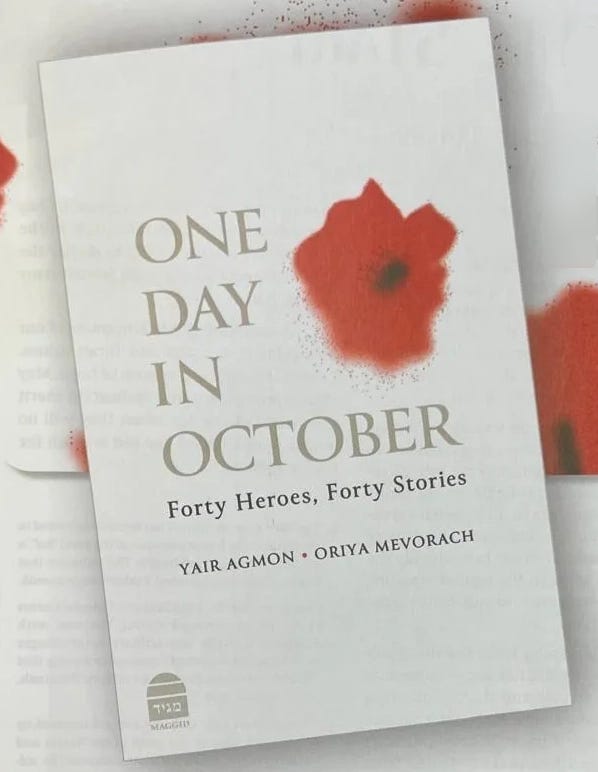


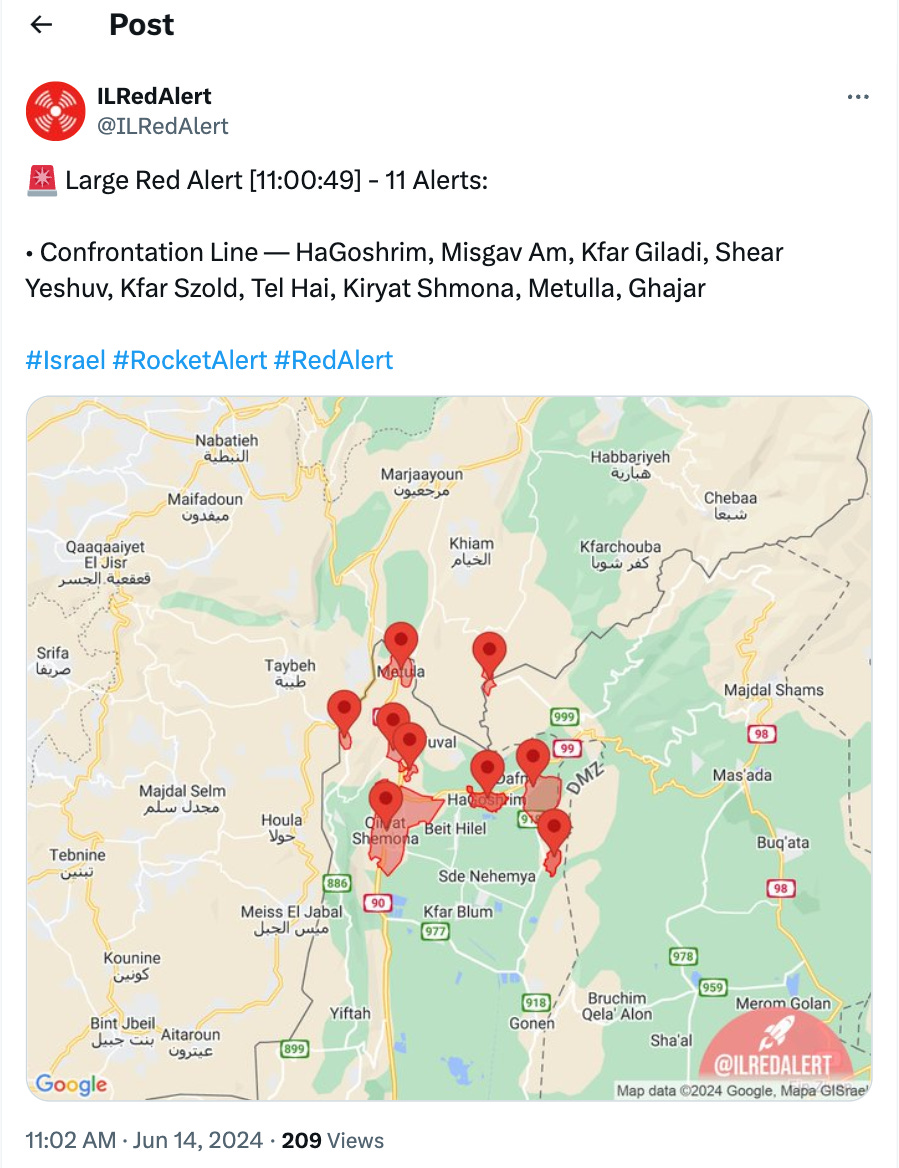
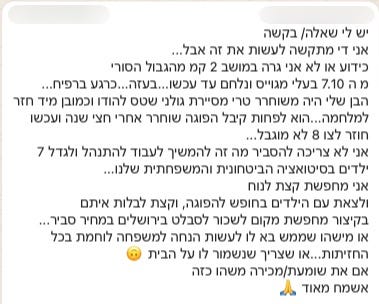

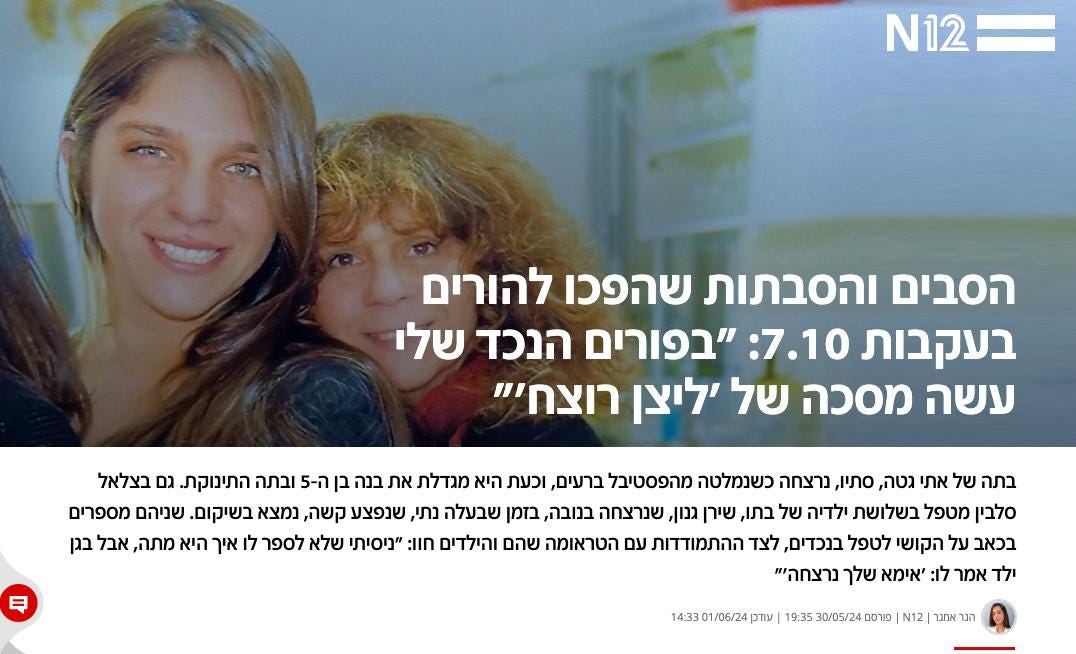

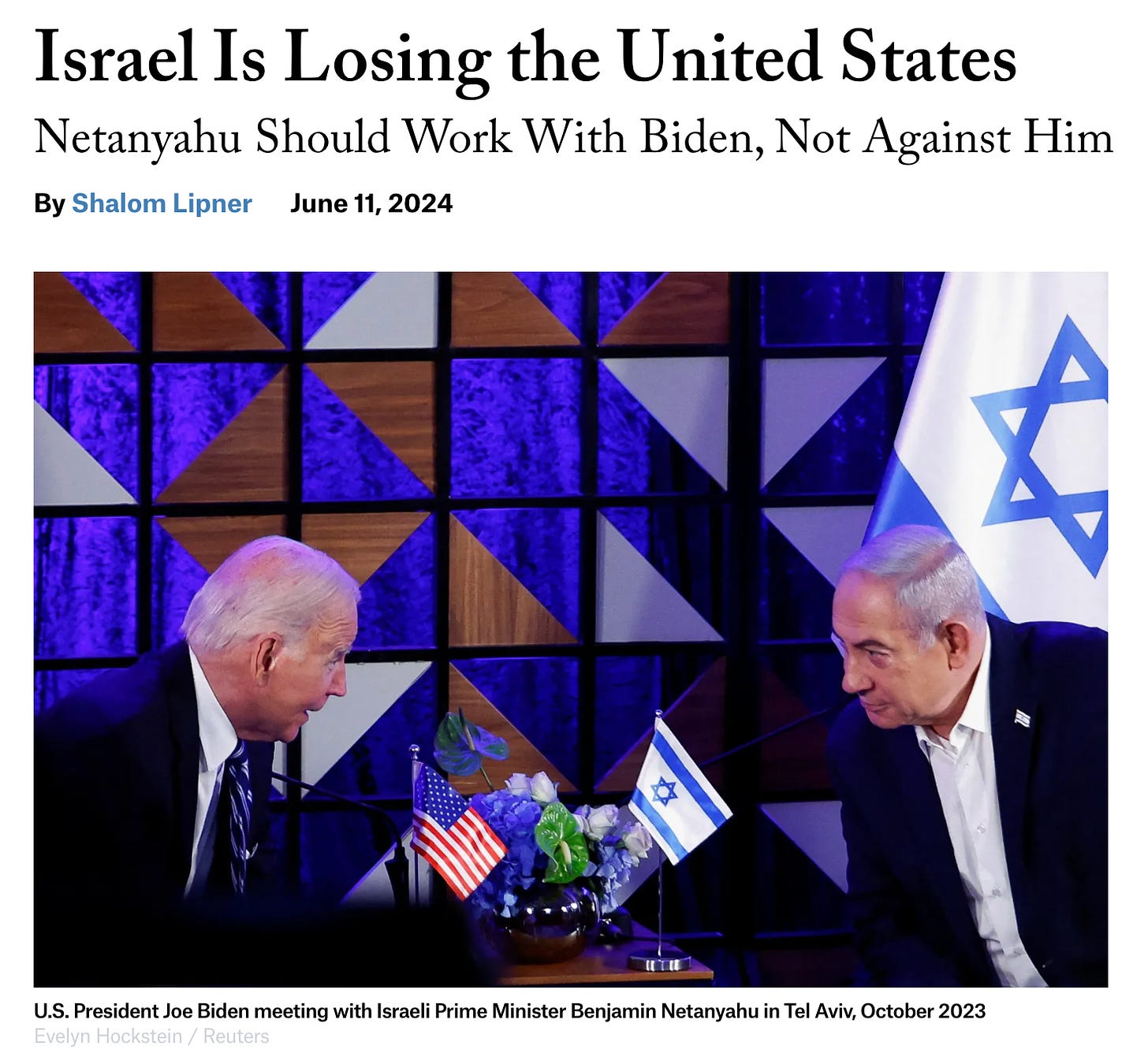
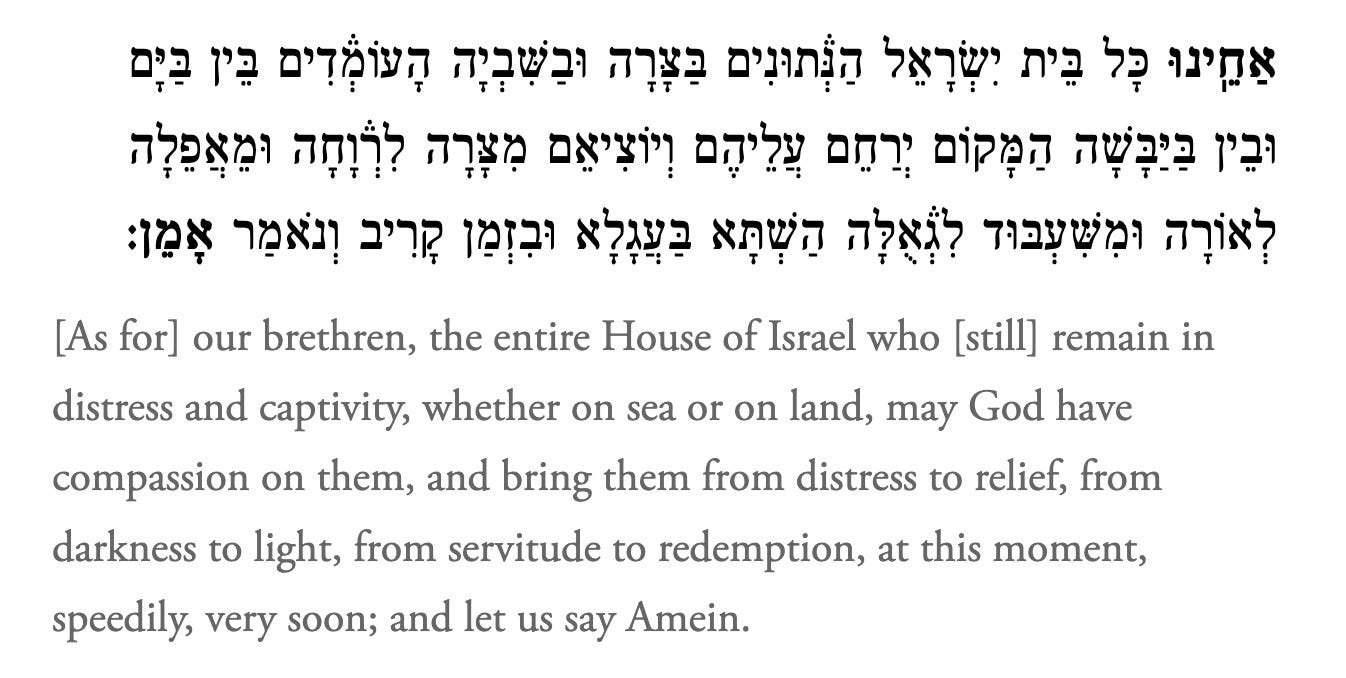










Our kids are not alright